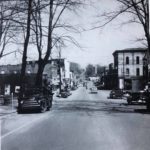Polity: A particular form of political system or government.
The Cold War has been said to have begun in 1945 with the first deployment of a nuclear bomb on Hiroshima, Japan, and the unraveling of the political relationship that had existed between the USA and the USSR during World War II. The Cold War was essentially an arms race between these two countries, which was eventually brought to a close with the tearing down of the Berlin Wall in 1990 and the subsequent breakup of the Soviet bloc countries. Having been born in 1946, I spent the first 45 years or so of my life, along with all the rest of the world, under the constant threat of a possible nuclear holocaust as the governments of these two nations jockeyed for position.
I was in high school when first introduced to the economic “isms.” The menu included communism, capitalism and socialism, which my classmates and I sorted out under the tutelage of our teachers. But, I must admit, I didn’t really give isms all that much thought beyond what was required in order for me not to have to repeat my history class.
I was an undergraduate student of business at the University of North Florida before the concept of capitalism would specifically reenter my realm of attention. In other words, up to that time I had completely taken for granted the blessings of the free economy that I had been enjoying for my entire life. Now I was learning how it actually worked.
And I learned not only how capitalism works, but I also learned why it works so well when properly implemented. In fact, it has worked well enough to make the USA, with a mere 311 million citizens, the wealthiest and most powerful country in the modern world. This, as compared to China, the world’s largest population with its 1.3 billion citizens, and India coming in a close second at 1.2 billion beating hearts, with per capita incomes of $7,600 and $3,100, respectively. The average per capita income in the USA is $39,900.
So, why does capitalism work so well? Because it is the natural economic state of humankind. Humans, as well as virtually all other animals, come into this life with intuitive reflexes that allow each to look out for himself or herself, and his or her brood. No one ever had to be trained to be a capitalist. One can visit the most backward, communities on the planet, and the parties will be engaging in capitalism without even the slightest encouragement. The minute the Libyan government fell and the bullets stopped flying, the Libyans were back engaging in capitalism. Setting up makeshift shops. Selling and bartering stuff. Capitalism in its most basic form works just fine without any government intervention.
So, let’s try a little thought experiment: Let’s say citizen A, upon whom I will bestow the fictional name of “Atlas,” lives in a tribal community in the jungles of Borneo. In Borneo, if you want to eat, you go fish. If citizen A has a good day and ends up with two fishes and determines that a little bread would go well with his fish, he trades one of the fishes for a loaf of bread from the baker who is sick and tired of eating bread all the time. Simple, simple, simple. And if he is clever enough to devise a seine and catch twenty fish at a time, he knows intuitively that his innovative genius and hard work will be naturally rewarded as he swaps even more fish for, say, a bottle of Pinot Grigio, a couple of creme brulees and a candle. With these goods in hand, he can then invite that little hottie with the ring in her nose–er, no, I’m sorry, that’s an American teenager–rather, that young lady with the four-inch loop inserted in her earlobe to dine with him and thus, perhaps, initiate some vino-enhanced hanky panky after dinner. Voila–capitalism.
On the other hand, socialism requires that any fishies that citizen A might catch with his net be shared with citizen B, upon whom I will hang the moniker “Otiose,” who hasn’t been smart enough, or hasn’t the gumption, to devise a means by which he could catch any fish for his own benefit. And, of course, as soon as A gives ten of his fishes to this less productive counterpart, said counterpart quickly learns that there is no longer any need to master the art of fishing at all, since he’s gonna get ten fish no matter what (and, fair enough, maybe he has a disability and cannot fish–special dispensation needs to be made in such a case. But, for our experiment, let’s assume he is just as strong and healthy as citizen A).
So, then what happens?
Continue “Occupy Capitalism and the Elephant in the Room”
 The City of Buchanan: Population 4,800. Settled in 1833 and named for James Buchanan, the fifteenth president of the United States. Cradled amongst the gentle hills of Southwestern Michigan.
The City of Buchanan: Population 4,800. Settled in 1833 and named for James Buchanan, the fifteenth president of the United States. Cradled amongst the gentle hills of Southwestern Michigan.